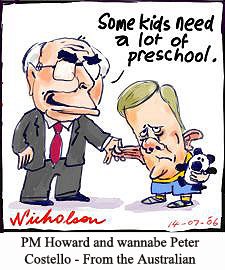 Time for a diversion, something more prosaic and less upsetting than global conflict.
Time for a diversion, something more prosaic and less upsetting than global conflict. I always find fights over leadership succession odd our democracies. All else being equal, the US would have this one right, with presidential primaries, but they can’t carry the fairness through to elections it would seem.
Canada has a sort of halfway situation, where leadership battles are taken to the broad party membership, with rules and oversight by Elections Canada. But that method is cumbersome and intrusive on political party’s interests.
Others like, Britain and Australia, leave the matter of leadership selection to the parties themselves. Some will include broad membership, but for most the decision is made within the parliamentary wing of a party.
Canada’s model accepts that public funding of parties reduces their claim of being ‘private’ organisations belonging solely to the membership. Well, to a degree at least.
It is difficult to sustain the ‘private’ concept when parties wield such enormous influence over a country’s life; more difficult when we are paying for them.
So none of the selection systems established to ensure democracy is perfect, but they all suffer an even greater unseen flaw; in nearly every circumstance, eventual leaders are chosen by a small handful of influential people and foisted on parties. A show of democratic selection is the best we will get.
Blatant maneuvering
What got me thinking about this now is the blatant maneuvering going on in both Australia and Britain’s governing parties.
The fight in Britain is an interesting one. Both Tony Blair and his deputy, John Prescott, have become so immersed in scandals that the talk of leadership change is constant.
Blair, if he survives, has earmarked Environment Secretary David Miliband to succeed the hapless Prescott.
Blair and Defence Secretary Gordon Brown have apparently made a leadership pact, known as the Granita Pact. Brown is waiting patiently for the leader to implode.
The deals, made behind closed doors, don’t even hint at any right for the party to choose.
However, given the current chaos surrounding that leadership, it is widely expected that, deal or not, the parliamentary party will have the final say. If that is the case Brown will have real challengers for PM, as will Miliband for the deputy’s slot.
Over in Australia long time Liberal Prime Minister John Howard simply doesn’t want to relinquish the power it took him so long to achieve. Even a decade of PM is not enough to satisfy his lust.
The opposition party are all for him holding onto the reigns, as an election approaches next year. Howard’s star is rapidly fading, but don’t tell him.
But treasurer, Peter Costello has been carrying the PM baton in his backpack for years as well. Every time it gets close, he gets a whiff of the ultimate job – a sly comment from Howard, a promise for the future, his hopes are cruelly dashed.
Again, recently, Howard has reneged on previous promises to his deputy, and his senior ministers are supporting him.
What the rest of the party might think is irrelevant; they will simply do as they are told and go with the flow.
One of the strongest endorsements of Howard came from the Sydney MP and parliamentary secretary, Malcolm Turnbull, who is seen by some in the Liberal Party as a future leader.
Turnbull can probably see the writing on the wall, the probable loss of government, and is willing to bide his time for now.
So however you look at it, whether you think you have a say, or not – you don’t! The deals are done and stitched up before it ever gets to a vote. It ain’t democracy, but no one seems to have the will or the power to change the status quo.

4 comments:
but no one seems to have the will or the power to change the status quo.
This is exactly the problem in the U.S. We talk about real change and then 98% of us vote for one of two parties.
That will never bring about change.
The parties have done everything they can to enshrine the two party system. That is one of the fundamentally corrupt acts of democracy, the rulers make their own rules.
People have become lethargic to politics, and the politicians love it, because insufficient number of people are checking their work. I'm still stumped at how to break this circle.
I would go a step further to say the ennui is actually driven by politicians to reduce challenge to their activities.
It is my contention that voting is just the first step, for most it is not even that.
Post a Comment